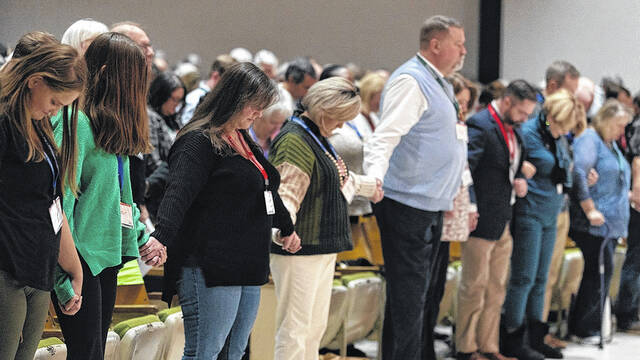
The 249 disaffiliating churches represent 32 percent of the congregations in the Conference and around 22 percent of the membership.
Photo courtesy of Amanda Packer, NC Conference
FAYETTEVILLE — Representatives from local United Methodist churches in eastern North Carolina met Saturday, Nov. 19, at Methodist University for a Special Called Annual Conference to receive requests and ratify disaffiliation for 249 churches. Bishop Leonard E. Fairley, the episcopal leader, presided over the conference.
A process for disaffiliation was established by the 2019 General Conference of The United Methodist Church. Paragraph 2553 of the Book of Discipline, the denomination’s law and policy book, identifies and charges the Conference Trustees with oversight of terms and conditions for churches wishing to disaffiliate over matters of conscience related to human sexuality. The sole purpose of this special called session of the Annual Conference was to complete the process of ratifying the current requests for disaffiliation for churches that have met the requirements outlined in Paragraph 2553 of the Book of Discipline and who have met the terms and conditions set by the Conference Trustees by Oct. 10, 2022. The complete process requires a two-thirds approval vote of eligible church members in each church wishing to disaffiliate and then ratification by a majority of the members of Annual Conference. Ratified disaffiliations are effective Dec. 31, 2022, as long as the church completes all parts of the agreement by that date.
Dr. David Peele, chair of the Conference Board of Trustees, presented the motion that “in accordance with Paragraphs 33 and 2529.1(b)(3) of the Book of Discipline and Judicial Council Decision 1379 which requires that ‘the disaffiliation agreement be ratified by a simple majority of the members of the annual conference present and voting,’ the Board of Trustees moves the ratification of the Disaffiliation Agreements of the churches named in the Addendum to this report distributed as members registered.”
A request was made by the Rev. Dr. Charles Michael Smith (retired) that the vote be taken by written ballot. Bishop Fairley accepted this request. There was discussion of the Trustees’ motion from the floor. A motion was made to call the question, and the body approved, so the Conference moved to the vote.
Before announcing the results of the vote, Bishop Fairley asked two things: 1) that people reach out and hold hands with the people around them while he prayed, and 2) that there be no applause or inappropriate displays at the reading of the vote.
The result of the vote was 957 yes to approve disaffiliations and 165 no. The Trustees’ motion carried.
Rev. Dr. Smith called for a ruling by Bishop Fairley as to whether the Conference could approve disaffiliation agreements for churches that were not based on Discipline Paragraph 2553, which specifically is about disagreement on matters of human sexuality. Bishop Fairley has 30 days after the special session to make a ruling, which will then go to the denomination’s Judicial Council. The Judicial Council is the church’s highest judicial body.
The 249 disaffiliating churches represent 32 percent of the congregations in the Conference and around 22 percent of the membership.
Most of the local church votes were not unanimous. Bishop Fairley assured persons who feel disconnected and lost in this process that the NC Conference is committed to keeping them connected to The United Methodist Church. Persons in churches that voted to disaffiliate who wish to remain United Methodist can move their membership to another United Methodist Church or to The United Methodist Collective of North Carolina, a new faith community in the Conference, until they find a new church home. The United Methodist Collective is a hybrid mission congregation created to provide connection and resources related to worship, discipleship, mission, sacraments, and pastoral care for people living in areas where there may no longer be a United Methodist church after the disaffiliation process is complete.
Dr. Christine Dodson, chair of the Conference Episcopacy Committee, gave a report from the Southeastern Jurisdictional Conference, held Nov. 2-4 at Lake Junaluska. The Conference showed their love and appreciation to Bishop Fairley and his wife, Dawn, for their leadership in the past 15 months with thunderous applause. Dodson then shared that Bishop Connie Mitchell Shelton will come to the Conference on January 1, 2023, as the episcopal leader.
At the close of the conference, Bishop Fairley encouraged those attending, saying, “The future is bright, especially because God has something to do with it. We know the end of this story because of who Jesus Christ is. May you hold each other dear regardless of what we voted on here. Hold each other dear in your prayers.”
The North Carolina Conference is one of 54 conferences of The United Methodist Church in the United States. It encompasses 56 counties in eastern North Carolina, from Elon to the coast and from the South Carolina border to the Virginia border. The conference strives to create healthy congregations and effective leaders in every place, making disciples of Jesus Christ for the transformation of the world. Learn more about the NC Conference atnccumc.org/about.
